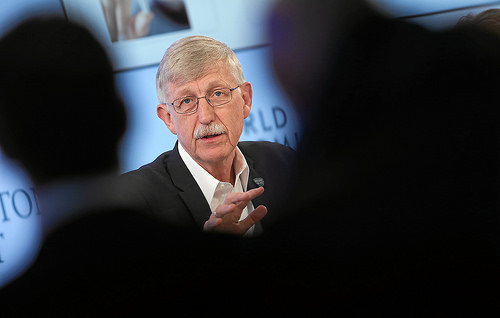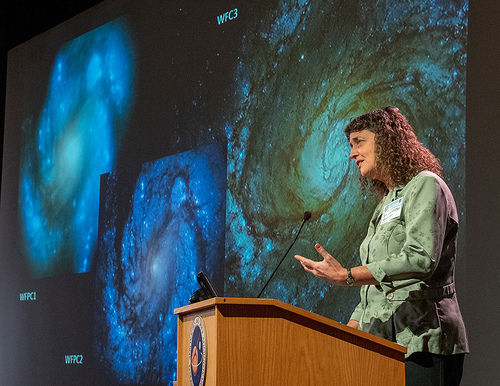
 )
)Last week I had the opportunity to attend the BioLogos conference in Baltimore, MD. Although there is a healthy dose of science, their conferences have a different feel than American Scientific Affiliation meetings, or at least the one I attended. ASA is primarily focused on scientists and students in the sciences, while BioLogos positions itself to address a broader audience. As a result, their conference attracts pastors, middle and high school teachers and interested members of the public in addition to an assortment of academics in the sciences, philosophy, history, theology, and other disciplines.
To serve this audience, the meeting is oriented around plenary talks and cultivating the sense of a single shared conversation, rather than discipline-specific conversations in different tracks. These plenary talks were recorded and can be streamed online now; a single fee provides access to all the talks. While that fee is a considerable bargain compared to the expense of traveling to and attending the meeting in person, it may not fit into everyone’s budget. So I’ve written brief reflections on each talk to help you assess the value proposition of purchasing streaming access. Also, be sure to check out an upcoming free talk linked at the bottom of this post.
What Do You Believe, Doctor? – BioLogos founder and current NIH director Francis Collins shared how he came to follow Jesus early in his medical career, having previously not seen a need for religion in his life. Collins has the affable and reassuring disposition you’d want in a family doctor but might not expect from one of the world’s leading scientists and policymakers. It’s obvious why his story has resonated so strongly with so many.
Science, Faith, & Public Witness – Pastor John Ortburg shared what I felt was primarily a message of encouragement and exhortation to the scientists in attendance. He focused on 4 gifts that scientists can offer our brothers & sisters and our neighbors. As a pastor ministering in Silicon Valley, he obviously has plenty of opportunities to interact with those in STEM fields and clearly has a lot of respect for such folks.
Creation: Rediscovering a Misunderstood Doctrine – Theologian and historian Justo González reminded us all that creation is not just a doctrine about past events and a causal chain extending back to a first cause. That’s the scientific perspective on creation; the doctrine of creation is much richer.
Science and its Limits: Properly Receiving God’s Good Gift – Philosopher Timothy O’Connor took up the issue of scientism and the limits of what science can tell us, both about the physical world and about the sum total of all truth. I’ve recently had conversations with folks who expressed concern that BioLogos and evolutionary creationism represented an overconfidence in science, so I found this session to be particularly timely.

 )
)Life Beyond Earth: What Would it Mean for Christians? – This might be the densest presentation, science-wise. Astrophysicist Jennifer Wiseman recaps our recent advances in exoplanet discovery: what we’ve found, how we found them, how we might be able to identify signatures of life. Astrobiologist Stephen Freeland discusses the remarkably robust nature of microbial life and how pervasive and persistent it can be. Finally, astronomer and BioLogos president Deborah Haarsma surveys some of the theological questions associated with the topic of intelligent life elsewhere in the cosmos.
Night at the Aquarium: Christians and Creation Care – I’m sorry to say I did not purchase the additional ticket to attend this lecture at the aquarium, having been to the aquarium several times as a grad student.
Animal Suffering: God and Pain in the Evolutionary Story – Bethany Sollereder, a science & religion scholar, took up the challenging topic of theodicy through the particular lens of animal suffering. I presume Sollereder is or has been a teacher, since she helpfully began by surveying the breadth of possible approaches to the question of animal suffering before describing her personal approach. While not necessarily giving them equal time, I thought she gave all the views a clear and fair explanation. I also found her particular approach to make a lot of sense.
Fearfully and Wonderfully Made: Embryos & Ethics – Biologist Jeff Hardin describes how developing humans change shape over time as they transition from single-celled zygotes to infants. He has plenty of images and videos that inspire ‘oohs’ and ‘aahs’. Then he explores some of the ethical questions around reproductive technologies and stem-cell-based therapies, such as what to do with embryos fertilized in surplus of what wound up being needed for achieving a pregnancy. He probably raises more questions than he offers answers for, acknowledging the need for policy experts and ethicists to contribute, but does offer some guidance.
Speaking God in a Scientific World: Reviving our Sacred Vocabulary – I was the most intrigued by journalist Jonathan Merritt’s premise, but ultimately found his talk underwhelming in execution. He makes an impassioned case for a decline in usage and understanding of sacred vocabulary (although I’m not entirely clear on whether Google n-gram data shows what he says it shows) and a need to transform our language to keep it alive. But no specifics are provided, nor is much of a connection made to a specifically “scientific world.” Eventually it became clear the details of transformation were saved for his new book; one or two examples would have been appreciated.
BioLogos 10th Anniversary Banquet – Francis Collins provides a history of the early days of BioLogos, then offers some commentary on where he thinks it should go in the next decade. He spent the most time making a case for leadership in the area of bioethics. His primary use case was the application of CRISPR/Cas9 gene editing technology, which shows real therapeutic promise when used in somatic cells and which raises many concerns when used in embryos and germline cells. Few if any individuals are more qualified to speak to this topic.
Unfortunately, due to other obligations I had to leave prior to Richard Mouw’s presentation.
During the conference, BioLogos also launched a podcast called The Language of God. Four episodes are available so far, including conversations with conference speakers Francis Collins and Jennifer Wiseman, if you want a further sense of their style and perspective.
And in other live streaming but non-BioLogos news, mathematician and ESN member Francis Su will be giving a talk entitled The Integration of Faith and the Academic Calling at 12pm EDT tomorrow (4/4/19). You can register for a free video stream here: https://zoom.us/webinar/register/WN_HD8yXl0wTdSyxHMcIDtu8A
Andy has worn many hats in his life. He knows this is a dreadfully clichéd notion, but since it is also literally true he uses it anyway. Among his current metaphorical hats: husband of one wife, father of two teenagers, reader of science fiction and science fact, enthusiast of contemporary symphonic music, and chief science officer. Previous metaphorical hats include: comp bio postdoc, molecular biology grad student, InterVarsity chapter president (that one came with a literal hat), music store clerk, house painter, and mosquito trapper. Among his more unique literal hats: British bobby, captain’s hats (of varying levels of authenticity) of several specific vessels, a deerstalker from 221B Baker St, and a railroad engineer’s cap. His monthly Science in Review is drawn from his weekly Science Corner posts — Wednesdays, 8am (Eastern) on the Emerging Scholars Network Blog. His book Faith across the Multiverse is available from Hendrickson.

Leave a Reply